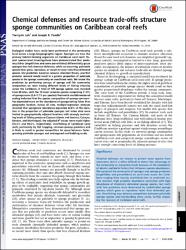/admin/item?itemID=ad2924c8-c83b-4103-99f2-6fbc04bed9fa
Chemical defenses and resource trade-offs structure sponge communities on Caribbean coral reefs

View/
Type of Access
OpenMaterial Type
ArticleType of Content
Scientific researchSubject
Recursos naturalesRecursos costeros y marinos
Arrecifes de coral
Hábitats y especies
Problemas ambientales
Language
EnglishCollection
- Investigación ambiental [1750]
Metadata
Show full item record| Abstract: | Chemical defenses are known to protect some species from consumers, but it is often difficult to detect this advantage at the community or ecosystem levels because of the complexity of abiotic and biotic factors that influence species abundances. We surveyed the community of sponges and sponge predators (angelfishes and parrotfishes) on coral reefs across the Caribbean ranging from heavily overfished sites to protected marine reserves. High predator abundance correlated with high abundance of chemically defended sponge species, but reefs with few predators were dominated by undefended sponge species, which grow or reproduce faster than defended species. Overfishing may enhance competition between palatable sponge species and reef-building stony corals, further impeding the recovery of Caribbean coral reefs. |
| Author(s): | Loh, Tse-Lynn
Pawlik, Joseph R. |
| Date: | 2014 |
| Published: | Proceedings of the National Academy of Sciences, 111(11), 4151-4156 |
| Citation: | Loh, T. L., & Pawlik, J. R. (2014). Chemical defenses and resource trade-offs structure sponge communities on Caribbean coral reefs. Proceedings of the National Academy of Sciences, 111(11), 4151-4156. Recuperado de: |
| URI: | https://bvearmb.do/handle/123456789/5405
|

